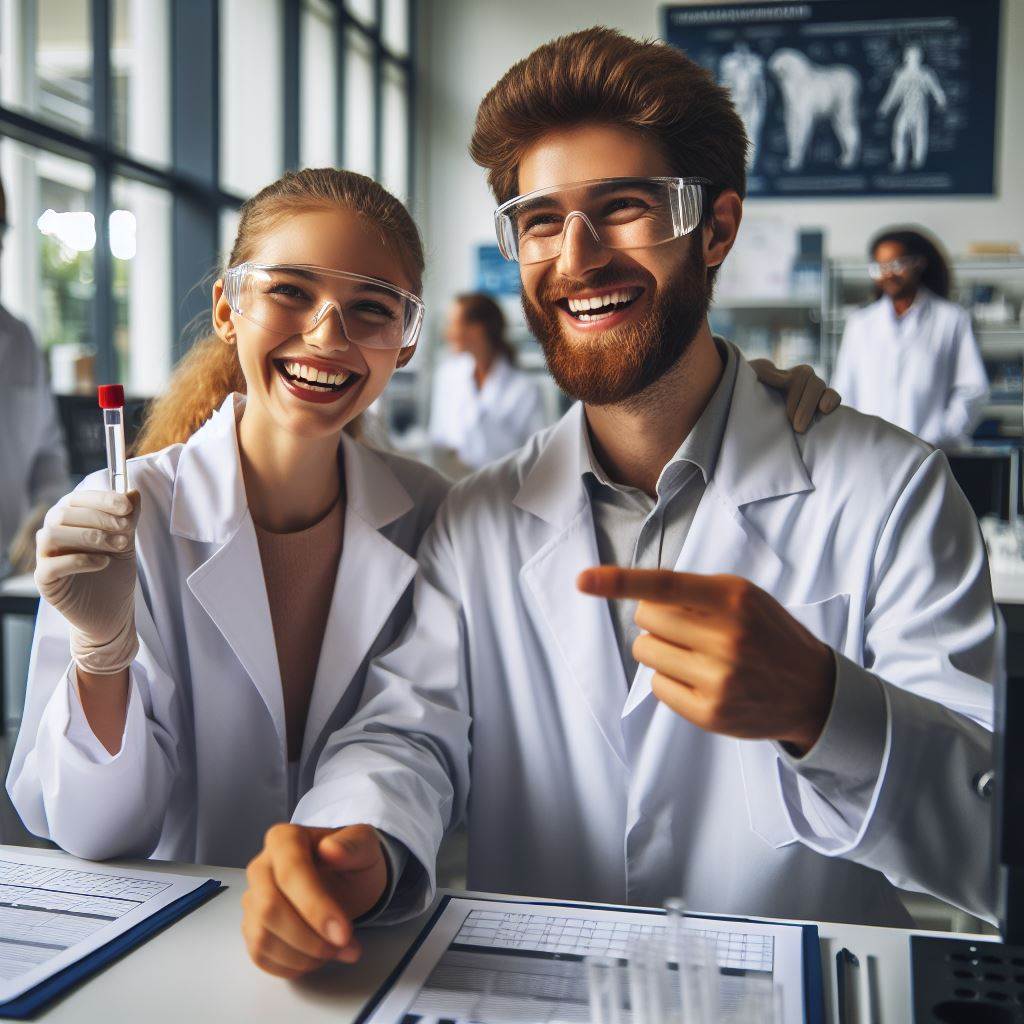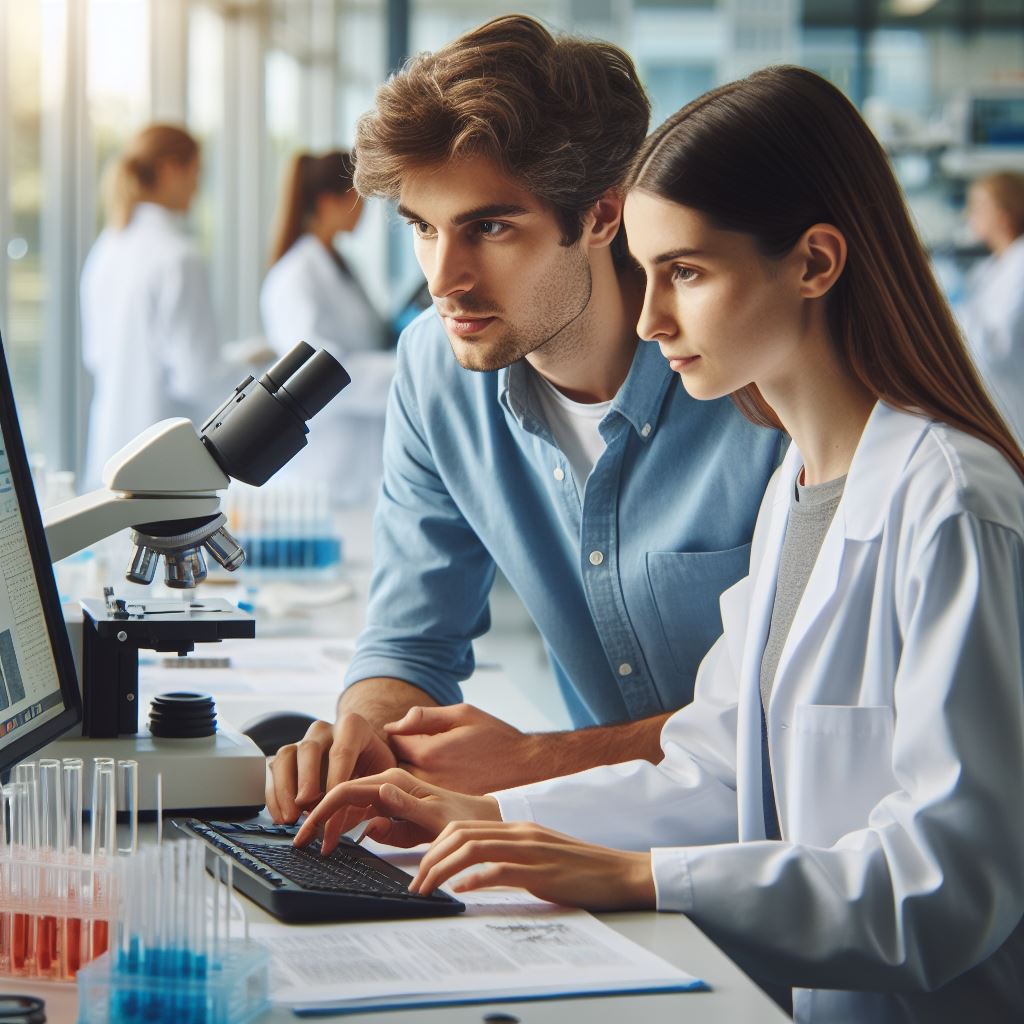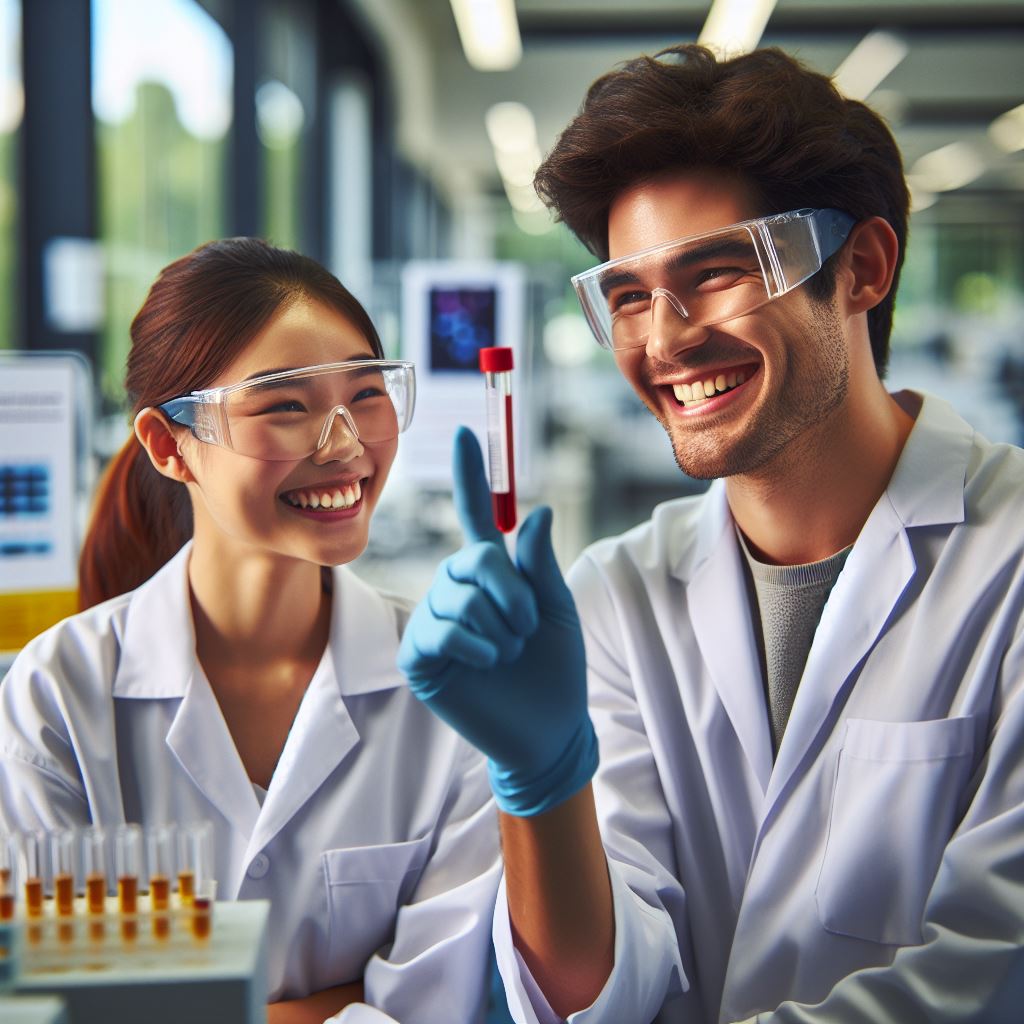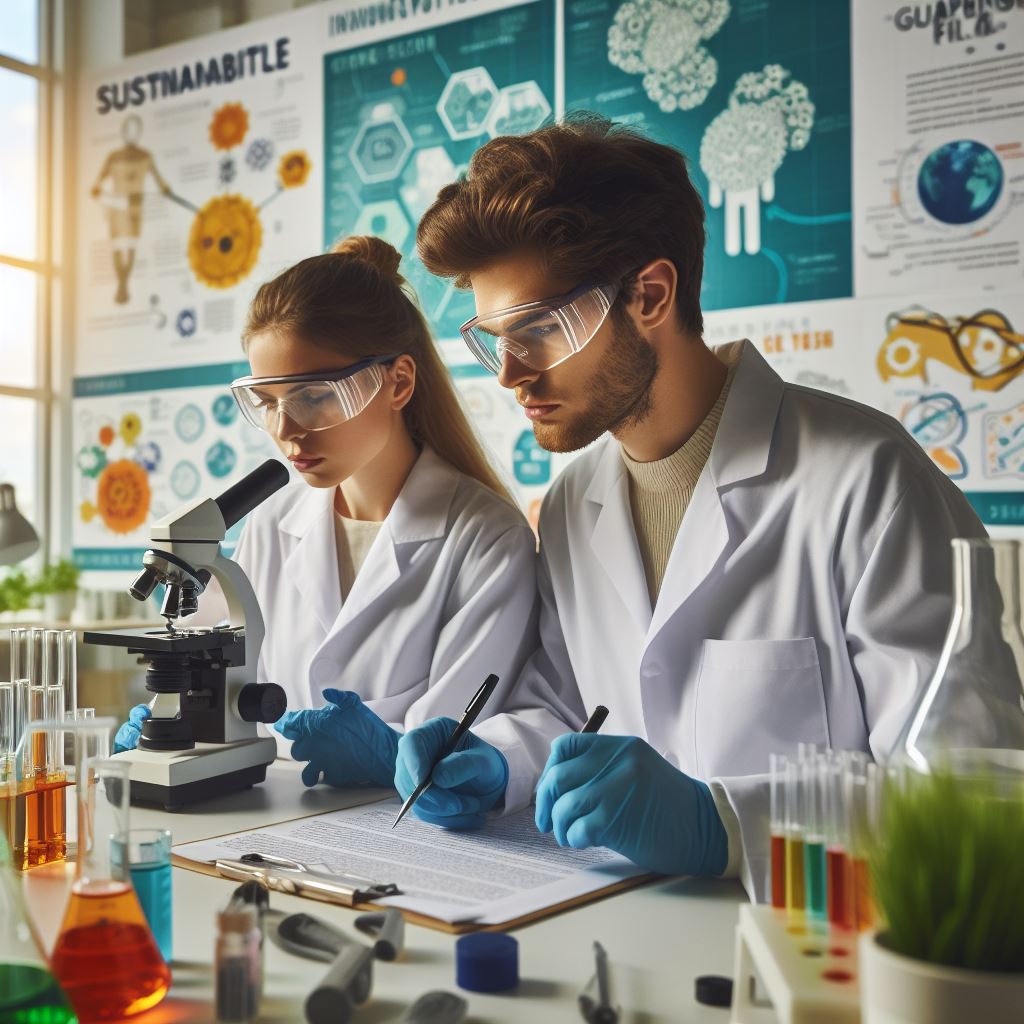Introduction
Explanation of what a lab technician is
A lab technician is a professional who conducts scientific tests and experiments in a laboratory setting. They play a crucial role in the medical field by ensuring accurate and reliable results.
In the medical field, lab technicians are essential for diagnosing and treating various illnesses and diseases. They work closely with doctors and other healthcare professionals to provide vital information for patient care.
Lab technicians perform a wide range of tasks, including collecting samples, preparing specimens, and operating laboratory equipment.
They follow strict protocols and procedures to maintain a sterile and controlled environment.
Importance of lab technicians in the medical field
The importance of lab technicians cannot be overstated as they are responsible for analyzing samples and detecting any abnormalities or irregularities. Their expertise and attention to detail greatly contribute to accurate diagnosis and treatment plans.
Lab technicians also play a crucial role in research and development, contributing to advancements in medical science. They assist scientists and researchers in conducting experiments, analyzing data, and documenting results.
Working as a lab technician can be challenging but fulfilling. It requires a strong knowledge of scientific principles, excellent technical skills, and a keen eye for detail.
Lab technicians must also possess good communication skills to effectively collaborate with colleagues and accurately relay information to medical professionals.
Therefore, lab technicians are vital members of the medical field, ensuring accurate and reliable test results that aid in diagnosis and treatment.
Their expertise and dedication contribute to advancements in medical science, leading to improved patient care and outcomes.
Overview of a Lab Technician’s Duties
Lab technicians play a crucial role in the scientific community by conducting various laboratory tests and experiments.
They are responsible for collecting and analyzing samples, operating and maintaining lab equipment, recording and interpreting data, and assisting with research and development projects. Additionally, they ensure compliance with safety protocols and regulations.
Conducting Laboratory Tests and Experiments
- Lab technicians are skilled in conducting a wide range of laboratory tests and experiments.
- They follow strict protocols and guidelines to ensure accurate and reliable results.
- These tests can include chemical analysis, microscopic examination, and genetic testing.
- Their findings contribute to scientific research, medical diagnoses, and technological advancements.
Collecting and Analyzing Samples
- Lab technicians collect samples from various sources, such as patients, animals, plants, or the environment.
- They carefully handle and store these samples to prevent contamination or degradation.
- Using specialized techniques and equipment, they analyze the samples to identify substances or detect abnormalities.
Operating and Maintaining Lab Equipment
- Lab technicians are proficient in operating a wide range of lab equipment, including microscopes, centrifuges, and spectrometers.
- They ensure that the equipment is calibrated, clean, and functioning properly.
- Regular maintenance and troubleshooting are performed to keep the equipment in optimal condition.
Recording and Interpreting Data
- Accurate documentation is a crucial aspect of a lab technician’s role.
- They record their observations, experimental procedures, and results in detail.
- Data interpretation involves analyzing trends, identifying patterns, and drawing meaningful conclusions.
- These records serve as a reference for future analysis and scientific publications.
Assisting with Research and Development Projects
- Lab technicians are valuable team members in research and development projects.
- They work closely with scientists, engineers, and researchers to achieve project objectives.
- They provide technical support, carry out experiments, and contribute to project reports and presentations.
- Their contributions often lead to breakthrough discoveries and innovation.
Ensuring Compliance with Safety Protocols and Regulations
- Lab technicians prioritize safety in the laboratory environment.
- They strictly adhere to safety protocols, including the proper handling and disposal of hazardous materials.
- They are familiar with safety guidelines and regulations issued by regulatory bodies.
- Regular training and inspections are conducted to maintain a safe working environment.
Basically, lab technicians are responsible for conducting laboratory tests, collecting and analyzing samples, operating and maintaining lab equipment, recording and interpreting data, assisting with research and development projects, and ensuring compliance with safety protocols and regulations.
Their work is essential in advancing scientific knowledge and contributing to various fields such as healthcare, agriculture, and environmental research.
Morning Routine
As a lab technician, my morning routine starts with arriving at the lab and preparing for the day. I review test requests and prioritize tasks based on urgency.
Next, I set up the necessary equipment and gather all the materials needed for the day’s experiments. Before beginning any work, I ensure that the lab instruments and workspace are properly cleaned and sterilized.
This is crucial to maintain a sterile environment and prevent contamination.
Arriving at the Lab and Preparing for the Day
- I walk into the lab, ready to dive into the exciting world of scientific experiments.
- As I enter, I put on my lab coat and sanitize my hands to maintain proper hygiene.
- Checking the schedule, I organize my station and prioritize tasks to ensure smooth workflow.
- I turn on the necessary equipment, including microscopes, centrifuges, and spectrophotometers.
- After ensuring that everything is in order, I gather the required test samples and reagents.
Reviewing Test Requests and Prioritizing Tasks
- I carefully analyze the test requests, assessing their urgency and importance.
- Some tests may be time-sensitive or critical for patient diagnosis and treatment decisions.
- Based on this assessment, I prioritize the tasks, ensuring that critical tests are given top priority.
- Proper prioritization helps in meeting deadlines and delivering accurate results to healthcare professionals.
- I also consider the complexity and duration of each test to better allocate my time and resources.
Setting up Equipment and Necessary Materials
- I carefully select the appropriate equipment based on the test requirements.
- This may include pipettes, test tubes, microplates, and specialized devices for specific assays.
- Once selected, I arrange the equipment in an organized manner for easy accessibility during the tests.
- I check the inventory of necessary materials such as reagents, chemicals, and buffers, restocking if needed.
- Setting up the equipment and materials beforehand allows for a seamless workflow and avoids delays.
Cleaning and Sterilizing Lab Instruments and Workspace
- Before commencing any work, I prioritize maintaining a clean and sterile environment.
- I start by cleaning the lab instruments using appropriate cleaning agents to remove any residue or contaminants.
- Sterilization is a critical step to eliminate any traces of microorganisms that may interfere with test results.
- I use autoclaves or other sterilization methods to ensure any instruments or glassware used are properly sterilized.
- 1 thoroughly clean the workspace, including benchtops, hoods, and safety cabinets, to prevent cross-contamination.
In general, as a lab technician, my morning routine sets the tone for the rest of the day. Arriving at the lab, I carefully prepare for the day’s tasks by reviewing test requests, setting up equipment, and sterilizing the lab instruments and workspace.
This attention to detail and organization ensures that experiments are conducted accurately and efficiently, leading to reliable results in the field of scientific research and healthcare.
Read: Innovative Chemistry Startups in Australia
Lab Testing and Experiments
As a lab technician, my day is filled with different tests and experiments. I follow standardized procedures and protocols to ensure accurate results.
Performing a Range of Tests and Experiments
One of my main responsibilities as a lab technician is to perform a range of tests and experiments. These tests require me to use various techniques depending on the nature of the experiment.
Your Personalized Career Strategy
Unlock your potential with tailored career consulting. Get clear, actionable steps designed for your success. Start now!
Get StartedWhether it’s testing the properties of a new drug or analyzing samples from an environmental study, I am always ready to take on the challenge. Each experiment has its own set of procedures that I need to strictly adhere to.
From extracting DNA to running chemical reactions, I utilize my knowledge and skills to carry out these tests efficiently. Attention to detail is crucial to ensure accurate and reliable results.
Following Standardized Procedures and Protocols
Following standardized procedures and protocols is a fundamental aspect of my job. These procedures have been established to maintain consistency and ensure that experiments are conducted safely.
I carefully read and understand the protocols before starting any experiment. This helps me in setting up the apparatus, adjusting variables, and carrying out the necessary steps in the correct order.
Adhering to protocols also involves wearing the appropriate personal protective equipment such as gloves, goggles, and lab coats. This ensures my safety and the integrity of the experiment.
Accurately Measuring and Recording Data
Another crucial part of my role as a lab technician is accurately measuring and recording data. Precision is vital in scientific experiments to ensure reliability and reproducibility.
I use a range of tools and instruments, such as pipettes and spectrophotometers, to measure various parameters. It is essential to calibrate these instruments regularly to maintain accuracy.
Once the data is collected, I record it meticulously, ensuring that all relevant information is included. This data serves as a reference for analysis and future experiments.
Analyzing Samples and Interpreting Test Results
Analyzing samples and interpreting test results are essential steps in any experiment. It is here that my analytical skills come into play.
After conducting the tests, I carefully examine the results, looking for patterns and anomalies. This requires a keen eye and a deep understanding of the underlying principles of the experiment.
I compare the results to established standards and reference materials to determine the significance and validity of the findings. This critical analysis helps in drawing meaningful conclusions.
Collaborating with Other Lab Staff and Scientists During Experiments
Collaboration is a significant aspect of working in a lab setting. As a lab technician, I collaborate with other lab staff and scientists during experiments.
This collaboration includes discussing experimental design, sharing insights, and troubleshooting any issues that may arise. Effective communication is crucial in ensuring smooth workflow and accurate results.
I value teamwork and understand the importance of each member’s contribution. By working together, we enhance the overall productivity and efficiency of the lab.
Stand Out with a Resume That Gets Results
Your career is worth more than a generic template. Let us craft a resume and cover letter that showcase your unique strengths and help you secure that dream job.
Get HiredGenerally, being a lab technician involves performing various tests and experiments, following standardized procedures, accurately measuring and recording data, analyzing samples, and collaborating with colleagues.
These activities contribute to the advancement of scientific knowledge and help in making important discoveries.
Read: Must-Attend Chemistry Conferences in Aus

Sample Collection and Processing
As a lab technician, one of the essential tasks I perform is collecting samples from patients or other sources. This crucial step ensures that we have the necessary materials for accurate testing and analysis.
When collecting samples, it is crucial to handle them with care and follow proper protocols. Each sample needs to be properly labeled and documented to avoid any mix-ups or confusion later on.
This process ensures that we have accurate records of each sample and its corresponding patient or source.
Once the samples are collected, the next step is to prepare them for further testing or analysis. This includes processing them in a way that preserves their integrity and ensures accurate results.
Depending on the type of sample, it might need to be separated into different parts or treated with specific reagents.
Proper storage and handling protocols are essential in maintaining the integrity of the collected samples. We need to ensure that the samples are stored at the correct temperatures and protected from any potential contamination.
Each sample has specific storage requirements, and we must adhere to them to avoid compromising the results.
The Importance of Sample Collection
The accuracy of laboratory test results heavily relies on the quality of the collected samples. If samples are collected incorrectly or mishandled, it can lead to inaccurate results, which can have serious consequences for patients or research studies.
Collecting samples from patients requires proper technique and attention to detail. We need to communicate effectively with patients, ensuring they understand the process and any instructions they need to follow. By doing so, we can minimize errors and ensure accurate results.
Furthermore, the meticulous documentation of each sample is vital for traceability and data integrity. By properly labeling and documenting the samples, we can easily track them throughout the testing process and link them back to the corresponding patient or source.
The Challenges Faced in Sample Collection and Processing
Despite the importance of sample collection and processing, it is not without its challenges. One common challenge is dealing with difficult or uncooperative patients. Some patients may have a fear of needles or may struggle with providing the necessary sample.
certain samples require specific techniques or equipment for accurate collection. This may include using a swab for a throat culture or obtaining a blood sample through venipuncture.
Mastering these techniques and ensuring patient comfort can be challenging for lab technicians.
Sample collection and processing are vital components of a lab technician’s role. By following proper protocols and handling samples with care, we can ensure accurate and reliable results.
Attention to detail, effective communication, and adherence to storage and handling protocols are key in this essential process.
Read: Australian Women in Chemistry: Trailblazers
Explore Further: Research Ethics: AU’s Perspective
Transform Your LinkedIn for Maximum Impact
Elevate your professional brand with a LinkedIn profile that attracts recruiters, showcases your expertise, and maximizes opportunities. Stand out in your industry with a profile built for success.
Boost ProfileExplore Further: Grants & Funding for Biology Research in AU
Administrative Tasks
- Maintaining detailed records and documentation.
- Inputting data into computer systems and databases.
- Ordering necessary supplies and reagents.
- Participating in laboratory quality assurance programs.
- Keeping up with industry trends and advancements through research and training.
As a lab technician, one of the essential aspects of my job is handling various administrative tasks. These tasks are crucial for the smooth functioning of the laboratory and ensuring efficient record-keeping.
Maintaining detailed records and documentation
Maintaining detailed records and documentation is a fundamental responsibility of a lab technician. Every test conducted, every sample analyzed, and every result obtained must be accurately recorded and documented.
This careful documentation helps in traceability and provides crucial information for future reference.
Inputting data into computer systems and databases
Inputting data into computer systems and databases is another critical task that lab technicians must undertake. This involves transferring the recorded information into computerized systems, ensuring data accuracy and accessibility.
It enhances the efficiency of data organization and retrieval, allowing for quicker analysis and decision-making.
Ordering necessary supplies and reagents
Ordering necessary supplies and reagents is a regular task for lab technicians. This involves assessing inventory levels, anticipating future requirements, and placing orders with suppliers.
Timely and accurate ordering ensures a continuous supply of essential materials, minimizing any potential delays in laboratory operations.
Participating in laboratory quality assurance programs
Participating in laboratory quality assurance programs is a vital aspect of a lab technician’s role. These programs are designed to maintain and enhance the quality and accuracy of testing procedures and results.
Lab technicians actively engage in activities such as proficiency testing, inter-laboratory comparison studies, and equipment calibration to ensure adherence to established standards.
Keeping up with industry trends and advancements through research and training
Keeping up with industry trends and advancements through research and training is an ongoing responsibility for lab technicians. The field of laboratory science is constantly evolving, with new techniques, technologies, and best practices emerging regularly.
Lab technicians continually update their knowledge through scientific literature, attending conferences, and participating in professional development opportunities.
Essentially, lab technicians are not just involved in conducting experiments and analyzing samples. They also play a crucial role in handling various administrative tasks that are integral to the smooth functioning of the laboratory.
From maintaining records to participating in quality assurance programs, their contributions are essential in achieving accurate and reliable results.
Read: The Future of Green Chemistry in Australia
Gain More Insights: Biology Fieldwork in Australia: What to Expect
You Might Also Like: Networking in Biology: Australian Conferences
Safety Protocols and Practices
In a laboratory, safety protocols and practices are of utmost importance to ensure the well-being and protection of lab technicians and others working in the facility. Adhering to strict safety guidelines and protocols is a fundamental aspect of a lab technician’s daily routine.
Safety Guidelines and Protocols
- Adhering to strict safety guidelines and protocols: Lab technicians must meticulously follow established safety procedures to minimize risks and prevent accidents.
- Properly handling and disposing of hazardous materials: Hazardous materials, such as chemicals and biological agents, require special care during storage, usage, and disposal.
- Using personal protective equipment (PPE) at all times: Lab technicians are required to wear appropriate PPE, including gloves, goggles, lab coats, and respiratory masks when necessary.
- Participating in safety trainings and drills regularly: Lab technicians undergo regular training sessions and drills to enhance their knowledge and understanding of safety protocols, emergency procedures, and the proper use of safety equipment.
Strict compliance with safety protocols in a laboratory setting is essential to prevent accidents, injuries, and potential exposure to hazardous substances. Lab technicians play a vital role in ensuring these safety standards are maintained.
Adhering to Strict Safety Guidelines and Protocols
As lab technicians, strict adherence to safety guidelines and protocols is ingrained in our daily routine. We understand the importance of taking necessary precautions to safeguard ourselves and everyone else in the lab environment.
One significant aspect of safety protocols is proper handling and disposal of hazardous materials. We carefully handle chemicals and biological agents, strictly following procedures to minimize any potential risks.
This includes using appropriate protective equipment, such as gloves and lab coats, to prevent direct contact with hazardous substances.
Personal protective equipment (PPE) is a staple in our wardrobe. We always wear gloves to protect our hands and prevent contamination.
Goggles shield our eyes from chemical splashes, while lab coats act as a barrier between potentially harmful substances and our skin. In certain situations, we also use respiratory masks to ensure we are not inhaling any harmful fumes or airborne particles.
To enhance our knowledge and awareness of safety measures, we actively participate in regular safety trainings and drills. These sessions help us stay up-to-date with the latest protocols while refreshing our memory on essential emergency procedures.
By simulating potential hazards and emergencies, these drills ensure our preparedness and enable us to respond efficiently.
The Significance of Safety Practices
Laboratory environments can present various potential hazards, making safety practices crucial for our daily operations.
Ignoring or neglecting safety measures can have serious consequences, ranging from minor accidents to severe injuries and even life-threatening situations.
Adhering to strict safety guidelines and protocols protects us from harm and keeps the laboratory environment secure. It also ensures the integrity of scientific experiments and research outcomes.
By taking safety seriously, we promote a culture of responsibility and professionalism within the lab community.
In review, safety protocols and practices are the pillars upon which a lab technician’s daily life is built.
Adhering to strict guidelines, properly handling hazardous materials, utilizing personal protective equipment at all times, and participating in regular safety trainings are crucial for maintaining a safe and productive laboratory environment.
You Might Also Like: Balancing PhD and Life in Australia
Conclusion
Recap of lab technician’s key responsibilities and tasks
A lab technician plays a critical role in healthcare and research settings. Their key responsibilities include conducting tests, analyzing results, maintaining lab equipment, and documenting findings.
Lab technicians are instrumental in diagnosing and treating patients, as well as advancing scientific knowledge. Their skills and expertise are indispensable to the success of medical and scientific teams.
Crucial role of lab technicians in healthcare and research
For aspiring lab technicians, pursuing this career path can be incredibly rewarding.
The opportunity to contribute to advancements in healthcare and research is both fulfilling and impactful. Lab technicians have the chance to make a difference in the lives of patients and society as a whole.
This blog section has highlighted the key responsibilities and tasks of a lab technician, emphasizing their crucial role in healthcare and research.
It has aimed to inspire and encourage individuals interested in this field to pursue a career as a lab technician.
The combination of technical skills, problem-solving abilities, and a passion for science make this profession an excellent choice for those seeking a challenging and fulfilling career.




